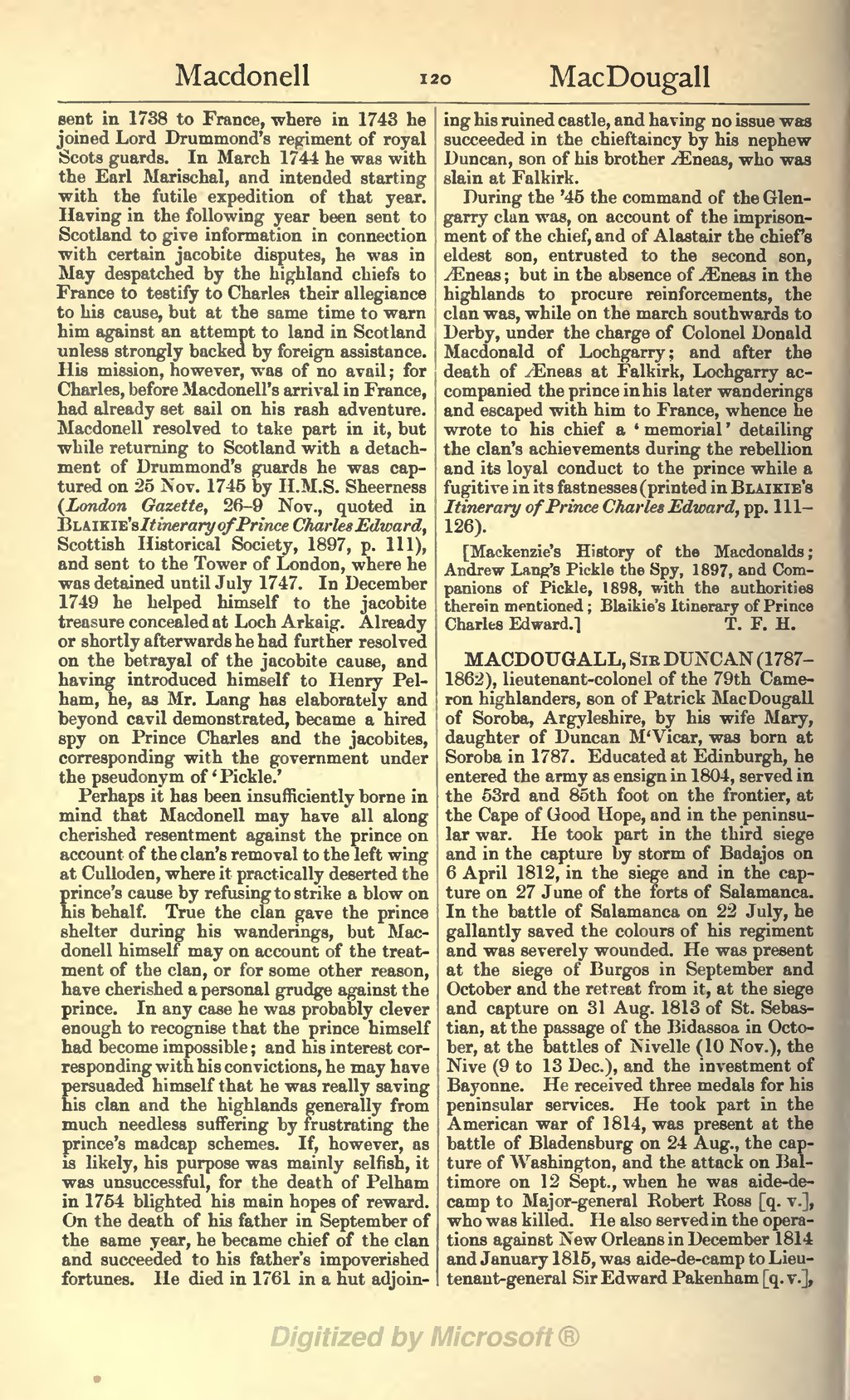sent in 1738 to France, where in 1743 he joined Lord Drummond's regiment of royal Scots guards. In March 1744 he was with the Earl Marischal, and intended starting with the futile expedition of that year. Having in the following year been sent to Scotland to give information in connection with certain Jacobite disputes, he was in May despatched by the highland chiefs to France to testify to Charles their allegiance to his cause, but at the same time to warn him against an attempt to land in Scotland unless strongly backed by foreign assistance. His mission, however, was of no avail; for Charles, before Macdonell's arrival in France, had already set sail on his rash adventure. Macdonell resolved to take part in it, but while returning to Scotland with a detachment of Drummond's guards he was captured on 25 Nov. 1745 by H.M.S. Sheerness (London Gazette, 26-9 Nov., quoted in Blaikie's Itinerary of Prince Charles Edward, Scottish Historical Society, 1897, p. 111), and sent to the Tower of London, where he was detained until July 1747. In December 1749 he helped himself to the Jacobite treasure concealed at Loch Arkaig. Already or shortly afterwards he had further resolved on the betrayal of the Jacobite cause, and having introduced himself to Henry Pelham, he, as Mr. Lang has elaborately and beyond cavil demonstrated, became a hired spy on Prince Charles and the Jacobites, corresponding with the government under the pseudonym of 'Pickle.'
Perhaps it has been insufficiently borne in mind that Macdonell may have all along cherished resentment against the prince on account of the clan's removal to the left wing at Culloden, where it practically deserted the prince's cause by refusing to strike a blow on his behalf. True the clan gave the prince shelter during his wanderings, but Macdonell himself may on account of the treatment of the clan, or for some other reason, have cherished a personal grudge against the prince. In any case he was probably clever enough to recognise that the prince himself had become impossible; and his interest corresponding with his convictions, he may have persuaded himself that he was really saving his clan and the highlands generally from much needless suffering by frustrating the prince's madcap schemes. If, however, as is likely, his purpose was mainly selfish, it was unsuccessful, for the death of Pelham in 1754 blighted his main hopes of reward. On the death of his father in September of the same year, he became chief of the clan and succeeded to his father's impoverished fortunes. He died in 1761 in a hut adjoining his ruined castle, and having no issue was succeeded in the chieftaincy by his nephew Duncan, son of his brother Æneas, who was slain at Falkirk.
During the '45 the command of the Glengarry clan was, on account of the imprisonment of the chief, and of Alastair the chiefs eldest son, entrusted to the second son, Æneas; but in the absence of Æneas in the highlands to procure reinforcements, the clan was, while on the march southwards to Derby, under the charge of Colonel Donald Macdonald of Lochgarry; and after the death of Æneas at Falkirk, Lochgarry accompanied the prince in his later wanderings and escaped with him to France, whence he wrote to his chief a 'memorial' detailing the clan's achievements during the rebellion and its loyal conduct to the prince while a fugitive in its fastnesses (printed in Blaikie's Itinerary of Prince Charles Edward, pp. 111-126).
[Mackenzie's History of the Macdonalds; Andrew Lang's Pickle the Spy, 1897, and Companions of Pickle, 1898, with the authorities therein mentioned; Blaikie's Itinerary of Prince Charles Edward.]
MACDOUGALL, Sir DUNCAN (1787–1862), lieutenant-colonel of the 79th Cameron highlanders, son of Patrick MacDougall of Soroba, Argyleshire, by his wife Mary, daughter of Duncan M'Vicar, was born at Soroba in 1787. Educated at Edinburgh, he entered the army as ensign in 1804, served in the 53rd and 85th foot on the frontier, at the Cape of Good Hope, and in the peninsular war. He took part in the third siege and in the capture by storm of Badajos on 6 April 1812, in the siege and in the capture on 27 June of the forts of Salamanca. In the battle of Salamanca on 22 July, he gallantly saved the colours of his regiment and was severely wounded. He was present at the siege of Burgos in September and October and the retreat from it, at the siege and capture on 31 Aug. 1813 of St. Sebastian, at the passage of the Bidassoa in October, at the battles of Nivelle (10 Nov.), the Nive (9 to 13 Dec.), and the investment of Bayonne. He received three medals for his peninsular services. He took part in the American war of 1814, was present at the battle of Bladensburg on 24 Aug., the capture of Washington, and the attack on Baltimore on 12 Sept., when he was aide-de-camp to Major-general Robert Ross [q. v.], who was killed. He also served in the operations against New Orleans in December 1814 and January 1815, was aide-de-camp to Lieutenant-general Sir Edward Pakenham [q. v.],
